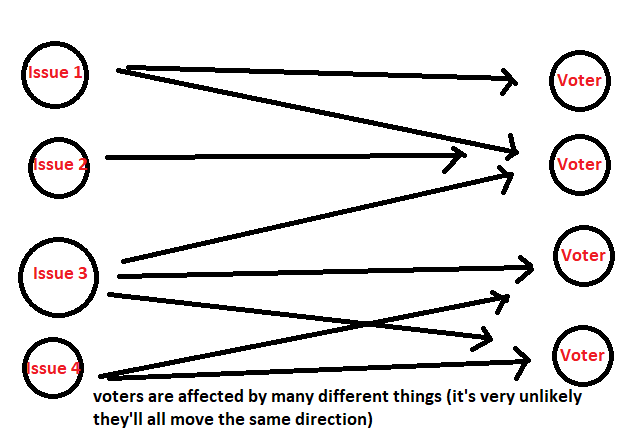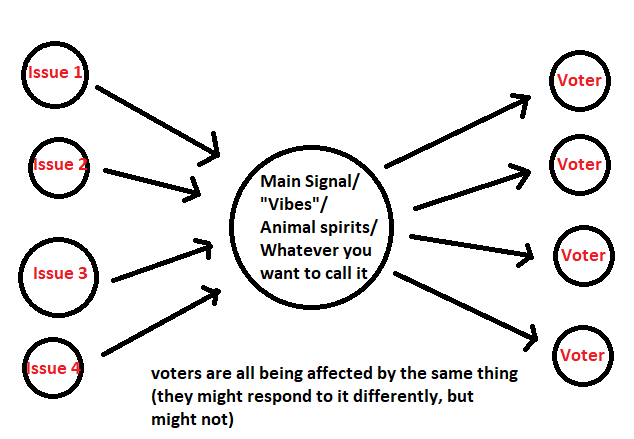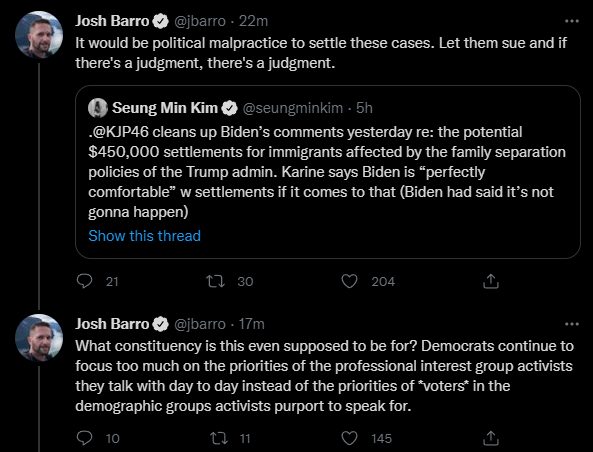
So here's why I think "vibes" matter.
First picture: how most analysis imagines elections work
Second picture: how elections actually seem to work
Think of voters as particles. The main thing affecting them isn't a bunch of little forces, it's just one big vibey main signal.

First picture: how most analysis imagines elections work
Second picture: how elections actually seem to work
Think of voters as particles. The main thing affecting them isn't a bunch of little forces, it's just one big vibey main signal.


Why do I think this is how elections seem to work? Because we see consistent kinds of shifts across many groups and geographies. Unless everyone's responding to the same thing, that's very unlikely.
That's not to say the shifts are always in the same direction! For instance, 2016-2020 consistently saw suburbanites move left and white rural areas move right. The key here is that whatever force was causing that change (Trump) was operating on pretty much everyone.
(Of course, underneath these big shifts, there ARE smaller local shifts based on individual candidates and issues and whatnot. They matter some at the margins. But odds are, if you're a politician, your fate will be decided by the main signal/"vibes," not the marginal stuff.)
This is important because so much of how people engage with politics presumes the first model: Address Issue 1 to win Group A, address Issue 2 to win Group B.
But if everything is mediated through some vibey main signal, targeting voters like that is not gonna work out great!
But if everything is mediated through some vibey main signal, targeting voters like that is not gonna work out great!
Instead, your emphasis HAS to be on winning the giant battle of vibes - the culture war, the media war, whatever you want to call it. You can't fully control this, but to the extent you can affect it, you'll see more results.
Delicately constructed issue positioning: pointless. Show votes in the Senate: worthless. Rebutting your opponents' arguments in op-eds: useless.
You're pulling levers that don't really do anything, doesn't matter how you pull them.
You're pulling levers that don't really do anything, doesn't matter how you pull them.
A party is better off with less nuanced, louder appeals that try to take over the conversation. Emotional appeals that drown out other stuff, attacks to make the other side toxic. Try to win each media cycle: your side is always right, the other party is always terrible.
Jokes, memes, sharp attacks, stuff that really sticks in people's brains, that's great. BRANDING is great - you want people to see your party's leaders as heroes, or stalwarts, or just trustworthy. Or failing that, mavericks, outsiders, whatever. Lots of stuff can probably work.
Making the other side seem racist or corrupt or self-interested is part of this. Think about how Clinton was seen: it wasn't like there was an actual scandal that killed her, there was just a public perception of some kind of miasmatic elite corruption around her. That's vibes!
When all else fails, flood the zone. Repetition works. Volume works. The goal here isn't inner serenity or a pristine self-image, it's to get into as many heads as possible, while hopefully looking better than the other folks.
Trump was a terrible politician who most people despised. Almost everything about him worked against him. But he was very, very good at getting in heads. His narcissism let him mount a ceaseless campaign to take over media coverage, blasting through things like a global pandemic.
By contrast, the politics of vibes do not come very naturally to genteel, college-educated liberals. They want to believe in subtlety, scooping up little pockets of voters until you hit 50%+1. That might work in local races, but it's doesn't make a dent in a national culture war.
• • •
Missing some Tweet in this thread? You can try to
force a refresh




